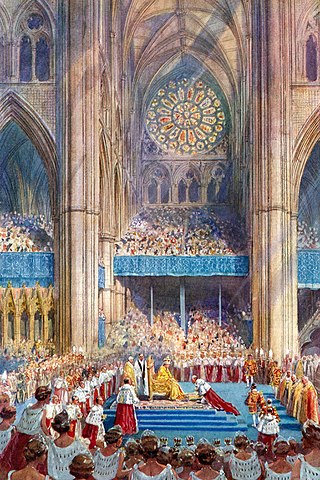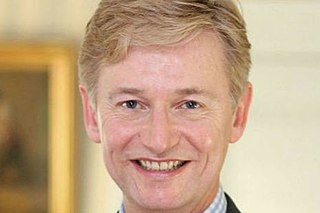Related Research Articles

The Most Honourable Order of the Bath is a British order of chivalry founded by King George I on 18 May 1725. The name derives from the elaborate medieval ceremony for appointing a knight, of which bathing was an element. Knights so created were known as 'Knights of the Bath'. George I constituted the Knights of the Bath a regular 'Military Order'. He did not revive the Order of the Bath, which had not previously existed as an Order, in the sense of a body of knights governed by a set of statutes and whose numbers were replenished when vacancies occurred.

The Lord Great Chamberlain of England is the sixth of the Great Officers of State, ranking beneath the Lord Keeper of the Privy Seal and above the Lord High Constable. The Lord Great Chamberlain has charge over the Palace of Westminster.

The Lord Steward or Lord Steward of the Household is an official of the Royal Household in England. He is always a peer. Until 1924, he was always a member of the Government. Until 1782, the office was one of considerable political importance and carried Cabinet rank.

The College of Arms, or Heralds' College, is a royal corporation consisting of professional officers of arms, with jurisdiction over England, Wales, Northern Ireland and some Commonwealth realms. The heralds are appointed by the British Sovereign and are delegated authority to act on behalf of the Crown in all matters of heraldry, the granting of new coats of arms, genealogical research and the recording of pedigrees. The College is also the official body responsible for matters relating to the flying of flags on land, and it maintains the official registers of flags and other national symbols. Though a part of the Royal Household of the United Kingdom, the College is self-financed, unsupported by any public funds.

In the United Kingdom, the Accession Council is a ceremonial body which assembles in St James's Palace in London upon the death of a monarch to make formal proclamation of the accession of the successor to the throne. Under the terms of the Act of Settlement 1701, a new monarch succeeds automatically. The proclamation confirms by name the identity of the new monarch, expresses loyalty to the "lawful and rightful Liege Lord", and formally announces the new monarch's regnal name, while the monarch and others, in front of the council, sign and seal several documents concerning the accession. An Accession Council has confirmed every English monarch since James I in 1603.

The Crown Jewels of the United Kingdom, originally the Crown Jewels of England, are a collection of royal ceremonial objects kept in the Jewel House at the Tower of London, which include the coronation regalia and vestments worn by British monarchs.

The coronation of the monarch of the United Kingdom is an initiation ceremony in which they are formally invested with regalia and crowned at Westminster Abbey. It corresponds to the coronations that formerly took place in other European monarchies, which have all abandoned coronations in favour of inauguration or enthronement ceremonies. A coronation is a symbolic formality and does not signify the official beginning of the monarch's reign; de jure and de facto their reign commences from the moment of the preceding monarch's death, maintaining legal continuity of the monarchy.

A Page of Honour is a ceremonial position in the Royal Household of the Sovereign of the United Kingdom. It requires attendance on state occasions, but does not now involve the daily duties which were once attached to the office of page. The only physical activity involved is usually carrying the long train of the King's robes.

The Keeper of the Privy Purse and Treasurer to the King/Queen is responsible for the financial management of the Royal Household of the Sovereign of the United Kingdom. The officeholder is assisted by the Deputy Treasurer to the King/Queen for the management of the Sovereign Grant, currently Sally O'Neill.
The Ecclesiastical Household is a part of the Royal Household of the sovereign of the United Kingdom. Reflecting the different constitutions of the churches of England and Scotland, there are separate households in each nation.
The Apothecary to the Household is an officer of the Medical Household of the Royal Household of the Sovereign of the United Kingdom. He has a salaried daily surgery.

The Honourable The King's Champion is an honorary and hereditary office in the Royal Household of the British sovereign. The champion's original role at the coronation of a British monarch was to challenge anyone who contested the new monarch's entitlement to the throne to trial by combat. Although this function was last enacted at the coronation of George IV in 1821, the office continues to descend through the Dymoke family.
Lieutenant Colonel Sir Andrew Charles Ford, GCVO is a retired British Army officer, and current member of the Royal Households of the United Kingdom. From 6 January 2006 to December 2018, he served as Comptroller of the Lord Chamberlain's Office.

Francis Knollys, 1st Viscount Knollys, was a British courtier. He served as Private Secretary to the Sovereign from 1901 to 1913.

Personal Aide-de-Camp to the King is an appointment in the Royal Household of the United Kingdom. It is distinct from that of other aides-de-camp, in that it is only bestowed on members of the British royal family holding military rank. The appointment may be signified by the post-nominal letters 'ADC(P)'. It is an honorary role with few duties or responsibilities attached; in the 20th century the Personal Aides-de-Camp were specifically listed as riding close behind the Gold State Coach at each Coronation, and walking or riding close behind the Gun Carriage at each State Funeral, of a monarch.
Groom of the Robes is an office in the Royal Household of the Sovereign of England. In 1953, the Groom of the Robes to Elizabeth II had the task of bringing forward the robes and other items of ceremonial clothing worn by the monarch at various points in the coronation service, ready to hand them over to the Mistress of the Robes and the Lord Great Chamberlain and to receive and remove those which were no longer required.
Groom of the Chamber was a position in the Household of the monarch in early modern England. Other Ancien Régime royal establishments in Europe had comparable officers, often with similar titles. In France, the Duchy of Burgundy, and in England while French was still the language of the court, the title was varlet or valet de chambre. In German, Danish and Russian the term was "Kammerjunker" and in Swedish the similar "Kammarjunkare".

The monarchy of the Bahamas is a system of government in which a hereditary monarch is the sovereign and head of state of the Commonwealth of the Bahamas. The current Bahamian monarch and head of state since 8 September 2022, is King Charles III. As sovereign, he is the personal embodiment of the Bahamian Crown. Although the person of the sovereign is equally shared with 14 other independent countries within the Commonwealth of Nations, each country's monarchy is separate and legally distinct. As a result, the current monarch is officially titled King of the Bahamas and, in this capacity, he and other members of the royal family undertake public and private functions domestically and abroad as representatives of the Bahamian state. However, the King is the only member of the Royal Family with any constitutional role.
The office of Groom in Waiting was a post in the Royal Household of the United Kingdom, which in earlier times was usually held by more than one person at a time – in the late Middle Ages there might be dozens of persons with the rank, though the Esquires and Knights of the Body were more an important and select group. Grooms-in-Waiting to other members of the Royal Family and Extra Grooms in Waiting were also sometimes appointed. For the general history of court valets or grooms see Valet de chambre.

Sir Clive Alderton is a British diplomat and courtier who has served as Private Secretary to King Charles III and Queen Camilla since 8 September 2022. As Private Secretary to the Sovereign, he is the senior operational member of the Royal Households of the United Kingdom. In this role, he took part in the 2023 Coronation. He is the 25th holder of the office of Private Secretary since its inception in 1805.
References
- ↑ "Coronation Claims Office to Look at Historic and Ceremonial Roles for King Charles III's Coronation". gov.uk (Press release). Archived from the original on 14 January 2023. Retrieved 14 January 2023.